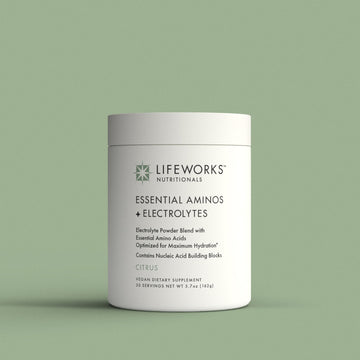Electrolytes are essential for hydration, energy, recovery, and mental clarity.
They power our nervous system, regulate our water levels, enable cellular function, and are crucial for protein synthesis, recovery, and brain function.
Moreover, they're vital for weight loss.
A lack of electrolytes can lead to dizziness, cramps, headaches, exhaustion, mental confusion, and even affect our heartbeat.
However, these exact minerals are needed by the body in precise ratios.
An imbalance—too much of one and not enough of another—can worsen the problems they're meant to solve.
In fact, the wrong ratio can cause dehydration and bloating, not to mention weight gain and slower recoveries.
LifeWorks Nutritionals Essential Aminos Electrolytes are precisely formulated for complete intracellular absorption in the exact ratios needed to maximize cell hydration, enabling full recovery and peak efficiency.
We go beyond this by adding 2g of Essential Amino per serving of electrolytes, which is crucial.
Essential amino acids are necessary for cells to fully utilize the received electrolytes. Without essential amino acids, our cells cannot derive the maximum benefit from electrolytes.
No other electrolyte product offers this.
Essential Amino Electrolytes are also free from sugars, caffeine, colorants, and toxins commonly found in other formulas that compensate for poor ratios.
They contain no gluten, soy, dairy, sugar, or erythritol, and are 100% vegan.
Essential Amino Electrolytes is the complete electrolyte recovery solution.
Try them today!
HOW ELECTROLYTES WORK: ENERGY, HYDRATION & CELLULAR HEALTH
Most people consider electrolytes only when they're dehydrated, and this is true.
But there's much more to it.
The water content in our cells directly impacts their ability to absorb oxygen and nutrients to create energy and expel waste.
Electrolytes regulate the water balance in our cells, determining whether to absorb more water or release it.
Salt allows water in and retains it, while potassium releases it.
An excess of salt causes bloating. Conversely, too little salt means that even if we drink more water, our cells cannot absorb it.
Too little potassium also results in bloating, as it doesn't allow water release. Excess potassium and insufficient salt cause our cells to reject water, even if we drink to hydrate.
These must remain balanced for the proper water management system of our cells.
However, sweating during a hot day or workout results in electrolyte loss.
This can lead to bloating or dehydration, affecting recovery, energy levels, nerve and brain function, and even our heart.
Even a 2% body weight drop from fluid loss can significantly impair athletic performance, causing tiredness, headaches, slow workout recovery, brain fog, and irregular heartbeat.
We experience at least a 2% drop every time we work out or go for a long run, contributing to post-exercise tiredness.
Drinking water alone doesn't solve this. Excessive water intake when dehydrated can worsen dehydration by flushing out more electrolytes.
Electrolytes regulate the cell's water management process, allowing nutrient and oxygen intake and waste expulsion.
Without this process, waste builds up inside cells, causing free radical formation, raising cortisol, causing cellular injury, and decreasing protein synthesis for muscle building and recovery.
Magnesium and calcium are crucial for mitochondria, the cell organelles that produce energy. Without them, energy production, recovery, and overall energy levels suffer.
But electrolytes do even more.
ELECTROLYTES AND THE NERVOUS SYSTEM
Our body is a conglomeration of trillions of cells that need to communicate with each other and the brain to function.
Some 20,000,000,000,000,000 bits of data are transmitted along our nerves every second.
Electrolytes facilitate these signals' passage.
These electrical charges move at speeds up to a couple hundred miles per hour, varying by activity and body area.
The proper speed of these signals is essential for our heart, blood flow, muscle movement and reaction speed, cognitive function, organ performance, endurance, recovery, protein synthesis, fat breakdown, and more.
Electrolytes and neurotransmitters help transmit messages between neurons, the individual cells making up our nerves. Without these, or with low levels, communication from the brain to the body slows or falters.
When this system breaks down, it can cause a wide range of "unexplainable" symptoms:
Irregular heartbeat, fast heart rate, fatigue, nausea, vomiting, diarrhea, constipation, abdominal cramping, muscle cramping, muscle weakness, irritability, confusion, headaches, and even numbness or tingling.
So, it's much more than just being thirsty.
Maintaining proper electrolyte levels ensures our nerves and cells stay hydrated, create energy, and operate at peak efficiency.

